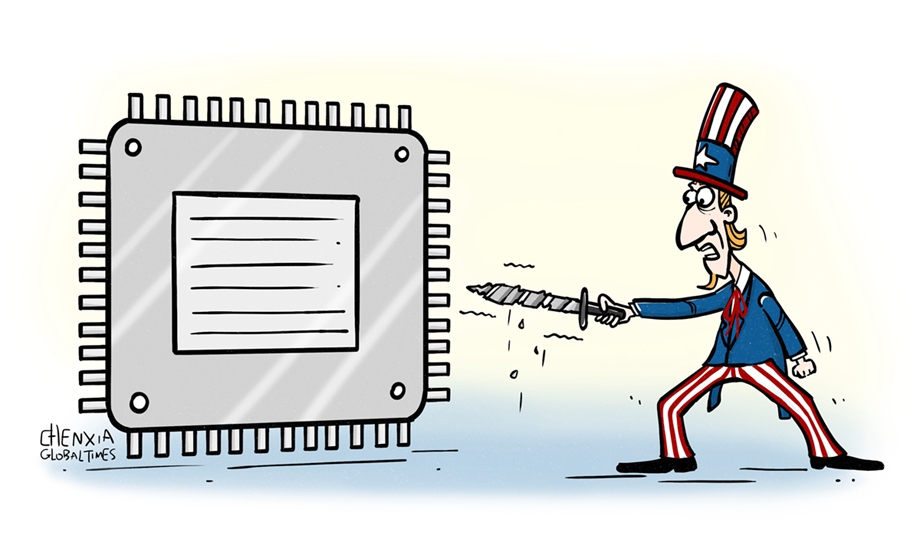US launches most savage attack on free trade

Illustration: Chen Xia/Global Times
The US government on Friday published a sweeping set of export control rules, including a measure to cut China off from certain semiconductor chips made anywhere in the world with US equipment. The US and Western media described the move with a number of superlative words, such as "the biggest shift in US policy toward shipping technology to China since the 1990s" and "the Biden administration's most aggressive measures to date." But such superlative words are better used elsewhere: This is the "most" blatant exposure of US technological hegemony, the "most" radical departure from the principle of fair competition, the "most" barbaric violation of international economic and trade rules, and the "biggest" intervention and destruction of the global industrial chain by a country's government.
Before reaching these "most," the US has gone through a process of escalating and increasing its export controls on China, or more precisely, its suppression against China's technology, but these measures have not achieved the effect that Washington desires and failed to curb China's technological development. The benefits the US could get continue to diminish. This has prompted the US to repeatedly expand the scope and intensity of the attack. Eventually, the US doesn't even need a fig leaf, and blatantly tramples on the principles and rules of free trade time and again.
In the process, the international credibility and moral image that the US has painstakingly built for many years has been substantially damaged, which makes it impossible to instigate a joint operation to suppress China beyond its circle of allies. It is difficult to reach a strong consensus within the transatlantic alliance or even within the US. When the US stabs a double-edged sword on others, it will inevitably hurt itself, and it will not care whether it hurts the interests and feelings of its allies.
In this series of new export control regulations issued by the US, many restrictions are extended to non-US companies and the US tries to prevent these companies from conducting normal mutually beneficial cooperation and trade with China. The US certainly doesn't have that power, and it primarily uses unilateral executive orders to illegally interfere with these businesses. But political intimidation can't overwhelm market forces. Washington officials also acknowledged that they had received no commitment from allies to implement similar steps, and that if other countries did not join, not only "the unilateral controls will lose effectiveness," but it also "risks harming US technology leadership."
The global division of labor in the semiconductor sector isn't an accident. Looking back on its development history, many US technology companies initially adopted the "one-stop" model. However, because of high costs and low output, they eventually evolved into the global division of labor mode step by step through continuous optimization of resource allocation. It is the path that has been repeatedly tested and proven to be in the best interests of all sides. This was an evolution in the history of human science and technology. Some people in Washington want to artificially degenerate it back to its primitive state. Such a historical reversal will collide with not only the world, but of course the US itself. As soon as Washington announced that it was going to "make big moves" against China's semiconductor sector, the stock prices of US semiconductor companies plummeted, reflecting the truest sentiment in the market.
China is the world's largest semiconductor consumption market. Any rational market actor, in a free and fair market environment, will never take the initiative to cut and "decouple" from the Chinese market, which is tantamount to "commercial suicide." The willingness of companies from the US and its allies to support, uphold, coordinate and implement the US government's export control policies toward China is bound to become increasingly low due to their considerations out of their own positions and interests, making the operation cost of this web of technological containment against China woven by Washington increasingly high. The logic is very simple. How can Washington, which recklessly tramples on international economic and trade rules, win sincere followers? A country that insists on engaging in zero-sum games has neither virtue nor ability to lead the world in science and technology.
Only arrogant and ignorant people can truly believe that the US can block the development of China's semiconductor or other technology industries by these illegitimate means. The US hegemony in science and technology that harms others without benefiting itself may bring some short-term difficulties to China's semiconductor industry, but will in turn strengthen China's will and ability to stand on its own in science and technology. Companies from other countries will be the first to seize the market gap left by US companies. Facing such a huge scope of cooperation and common interests, how can the US have the ability to destroy them?
It can only be said that in its efforts to suppress and contain China, Washington has lost its mind and way. This time, in full view of the world, people saw how a hegemonic power was gradually exposing itself and how it was running out of tricks, and how it has gradually lost self-confidence in the face of rising powers, so that it has become increasingly sensitive, anxious and unscrupulous. The US that is turning back the wheel of history is undoubtedly very dangerous, and the world should not indulge the US.








